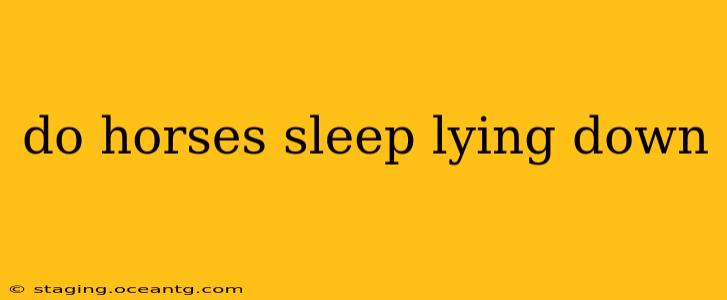Horses are majestic creatures, known for their grace and power. But did you know that their sleep patterns are quite fascinating, and often misunderstood? A common question many people have is: do horses sleep lying down? The short answer is yes, but it's more complex than that. This comprehensive guide delves into the specifics of equine sleep, addressing common misconceptions and exploring the unique ways horses rest and recharge.
How Much Do Horses Sleep?
Unlike humans who typically sleep for 7-8 hours, horses have a much more fragmented sleep cycle. They require approximately 3-4 hours of total sleep per day, but this is spread out over several short periods, often throughout the day and night. This is because they are prey animals, and prolonged periods of deep sleep leave them vulnerable to predators.
Do Horses Sleep Standing Up?
Yes, horses are capable of sleeping while standing up. This unique ability is due to a specialized locking mechanism in their legs called the stay apparatus. This system allows them to remain standing with minimal muscle effort, conserving energy and allowing for brief periods of rest and light sleep. While standing, horses experience primarily light sleep, characterized by periods of drowsiness and reduced awareness. They are still easily awakened by any perceived threat.
Do Horses Sleep Lying Down? And If So, When?
While they can sleep standing, horses do need to lie down for deeper, more restorative sleep. This deep sleep, known as REM (rapid eye movement) sleep, is crucial for physical and mental restoration. However, this vulnerable position means they usually only lie down to sleep when they feel completely safe and secure. This is most often in familiar environments, and typically occurs in short periods during the night or during times of minimal activity. You’re more likely to see a horse sleeping lying down in a well-protected pasture than in a busy stable.
How Long Do Horses Sleep Lying Down?
When horses do lie down to sleep, they usually only do so for short bursts of time, rarely exceeding 30 minutes at a time. Longer periods of lying down sleep are less frequent and are usually associated with foal horses or very old horses, or horses who feel exceptionally safe and comfortable in their environment.
What About Foals and Older Horses?
Foals, being younger and less capable of defending themselves, will spend more time lying down to sleep. Conversely, older horses may also spend more time lying down due to age-related changes in their muscles and joints, making it harder for them to maintain a standing posture for long periods.
Why Is It Important for Horses to Get Enough Sleep?
Sufficient sleep is crucial for a horse's overall health and well-being. Lack of sleep can lead to:
- Weakened immune system: Making them more susceptible to illness.
- Reduced performance: Affecting their athletic ability and work capacity.
- Behavioral changes: Potentially resulting in irritability, anxiety, or other behavioral problems.
- Increased risk of injury: Due to reduced alertness and coordination.
Understanding equine sleep patterns is essential for responsible horse ownership. Providing a safe, secure, and comfortable environment is paramount to ensure your horse gets the rest it needs to thrive. By understanding their unique sleep requirements, you can contribute to their overall health and happiness.
